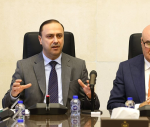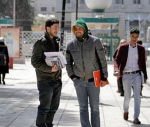You are here
Abdul Mahdi's decree risky both personally, politically
Jul 11,2019 - Last updated at Jul 11,2019
Iraqi Prime Minister Adel Abdul Mahdi's decree ordering Shiite paramilitary factions belonging to the Popular Mobilisation Units (PMU) to renounce their political affiliations and integrate fully with the regular army is unlikely to be obeyed by the July 31 deadline. Shortly after he issued his decree, posters proclaiming the PMU is "staying" appeared on the streets of Baghdad.
Abdul Mahdi's plan is flawed and could create divisions within the Iraqi military. According to the decree, the militias, which can field more than 140,000 fighters, must disarm, disband and merge with the army, which only has 54,000 active soldiers. While absorbing the militias would expand and, in theory, strengthen the army, the militias and their commanders could also dominate the regular forces and overwhelm them with veteran Shiite fighters who assumed major roles in the campaign against Daesh. Since troops in regular units are already mostly Shiites, this could turn what is supposed to be a national army into a sectarian force.
There are other reasons why the plan will fail.
On the domestic level, the militias are the political bases of their founders and leaders, who now head political parties and are unwilling to capitulate to Abdul Mahdi although he is nominally commander-in-chief of the military.
While the Iraqi government has been paying the militias' salaries and perks for some time, the militias have other sources of finance which provide a degree of independence from the government. They have business interests, man checkpoints and conduct operations against Daesh remnants.
Militia members, who fought against Daesh alongside the Iraqi army and US forces, have already said they will resist. Former Lebanese army brigadier and military analyst Amin Hoteit argued that accepting Abdul Mahdi's order could undermine their determination to continue fighting Daesh, particularly since many of these units are based in their own towns and cities and constitute local defence forces.
On the regional level, powerful militia commanders and men are closely connected to Iran, which has always been unlikely to accept the loss of its militia assets in Iraq. Iran is certain to refuse at this time due to rising tensions with the US. During the campaign against Daesh, Iran provided funds, arms and advice to the PMU. Iran's Revolutionary Guard Quds Force Commander Qassem Soleimani played a key role in coordinating operations between the Iraqi army and militias. Iran's supreme leader Ayatollah Ali Khamenei has said the Iraqi government should not merge the militias with the military.
Although Abdul Mahdi is in no position to implement his decree, one militia, Saraya Al Salam, has been ordered by its founder, nationalist cleric Moqtada Al Sadr, to integrate with the country's forces. Sadr's political party is the largest in parliament. Sadr, however, does not speak for pro-Iranian militia leaders. He is critical of Iran's intervention in Iraqi affairs as well as US military and political involvement.
Qais Al Khazali, head of Ahl Al Haq, a major militia, welcomed the decree as a "step in the right direction" but his fighters are expected to "remain a parallel force under government supervision", according to Ali Mamouri writing in Al Monitor.
The second largest parliamentary party is headed by Hadi Al Amiri, founder and leader of the Badr Brigade, which was established as the military wing of the Iraqi Islamic Council and fought on Iran's side in the Iran-Iraq war (1980-88). Amiri was a senior commander of the PMU and was said to be the most popular, most powerful pro-Iran leader of the PMU. The Badr Organisation argues all PMU factions have already accepted the supervision of the commander-in-chief.
Abdul Mahdi's decree was risky personally because he is an independent, without party or militia, who was elevated to the premiership by Sadr and Amiri. His decree is risky politically because it was said to have been taken under US pressure after unclaimed attacks on Saudi oil pipelines, Iraqi bases hosting US forces and a compound used by a US oil firm Exxon Mobil.
As a compromise candidate for prime minister, Abdul Mahdi is not in a strong position to implement his decree. Although militias that do not comply by the end of this month will be deemed outlaws, their commanders are unlikely to be concerned. Appointed last October, Abdul Mahdi was unable to complete his Cabinet until June 24 this year, with one post missing. Furthermore, he now faces a freshly-formed opposition front, and does not have the resources to reconstruct towns and cities destroyed during the war against Daesh and enable their inhabitants to go home. Hundreds of thousands, mainly Sunnis, remain displaced and disaffected. Daesh has been trying to exploit this situation.
Shiites are in revolt. The lack of clean water and power outages in the south have turned citizens of Basra and other main cities and towns in this predominantly-Shiite region against Baghdad, Iran and pro-Iranian militias. Protesters blame squabbling among political factions and massive corruption for the government's failure to provide water, electricity, refuse collection and jobs.
Demonstrations in Basra began in 2015 and escalated last summer. This year's protests are more organised. The Sadrists and supporters of the National Wisdom (Hikma) Movement, led by Ammar Al Hakim, a former client of Tehran who has moved away from Tehran, are leading this summer's campaign. Rallies are also taking place in the capital on Fridays. The protests are seen as a warning to Abdul Mahdi to improve services and end graft. Since Abdul Mahdi is under serious challenge, he cannot afford to alienate the militias.
Thanks to the 2003 US occupation and installation of sectarian politics in formerly secular Iraq, the country has become a failed state, where Shiites, Sunnis and Kurds, the main stakeholders, row over the wreckage.












